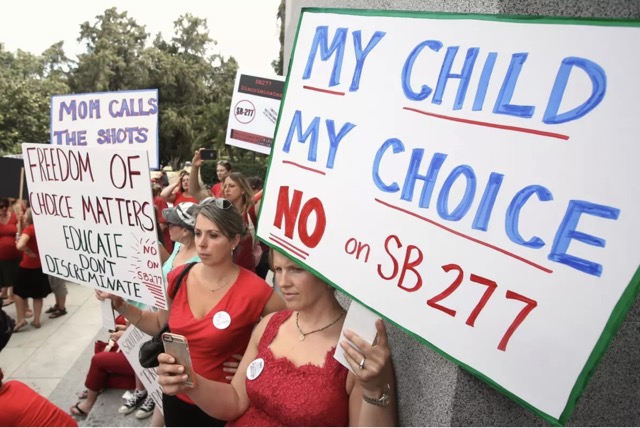Vaccine Requirements
MURRIETA (CNS) – Attorneys representing four mothers — two of whom reside in the Inland Empire — challenging California’s denial of religious- based exemptions to vaccination requirements for kids’ admission to public schools are federally appealing a lower court’s decision siding with the state that there’s no bar to mandating the shots.
“This law targets families of faith by denying them the basic right to make medical and educational decisions,” attorney Robert Tyler with Murrieta-based Advocates for Faith & Freedom said. “The law takes the drastic step of banning children from the schoolhouse due to their sincerely held religious beliefs and those of their families.”
Last month, U.S. District Judge Marilyn Huff in San Diego dismissed the plaintiffs’ federal civil rights lawsuit seeking an injunction against the state’s enforcement of Senate Bill 277 without a “personal belief exemption” to the vaccination schedule — an exemption that existed from 1961 to 2016.
SB 277 only allows medically valid exemptions, such as pre-existing disorders that could pose risks if a person receives one of the immunizations for Hepatitis B, polio, diptheria-tetanus-pertussis, varicella, or measles, mumps and rubella.
The plaintiffs said that not only are the shots required when children are enrolled for the first time in K-12 programs, but boosters are mandated later, possibly totaling 17 shots by the end of a youth’s K-12 attendance.
“The parents we represent think remaining true to their faith is as important as the numerous non-faith based categories that California already exempts,” Tyler said. “We are appealing because California cannot simply erase the Constitution when it becomes politically inconvenient. This is about more than vaccines; it’s about the future of religious liberty and parental rights in America.”
Huff found no grounds for issuing an injunction or invalidating any provision of SB 277, instead recognizing California Department of Justice attorneys’ arguments that no part of the law “unfairly impacts individuals with religious beliefs.”
“The plaintiffs’ claims are unsupported as a matter of federal constitutional law, which for decades has consistently held that a state’s exercise of its police powers in protecting the public from communicable diseases is rationally based,” according to a brief filed by state prosecutors. “States have a legitimate, if not compelling, interest in requiring children to be vaccinated before entering school.”
The plaintiffs — Kristi Caraway of Lake Elsinore, Tiffany Brown of Hollister, Sarah Clark of Temecula and Sara Royce of Pala — are seeking reapplication of the personal belief exemption because of concerns over the contents of the vaccinations and their potential negative impacts, according to the suit.
The youngest of Caraway’s three children “developed injuries following vaccination, specifically the HepB and MMR vaccines,” the plaintiffs stated.
“The child was non-verbal until age 6, diagnosed with autism,” according to the suit. “Following the boy’s injuries, Caraway and her husband began to research vaccines and discovered that many contain aborted fetal cells. The Caraways made the decision to stop vaccinating their children.”
The plaintiffs relied on the U.S. Centers for Disease Control & Prevention’s published “excipient” lists associated with some drugs, as well as the U.S. Food & Drug Administration’s online information sheets, the Journal for Clinical Microbiology, the National Academy of Sciences and other entities to bolster their position.
The civil complaint noted that the MRC-5 and WI-38 cell lines, which “have their origins in … lung tissue of aborted fetuses,” have been previously identified in chickenpox and MMR vaccines.
“Many individuals religiously object to vaccinations based on the use of aborted fetal tissue in certain vaccinations,” the complaint said.
The plaintiffs further objected to “aluminum adjuvants,” thimersal, mercury, polyethylene glycol and formaldehyde concentrated in various shots, raising the prospect of harmful side-effects.
“Many people have a sincerely held religious belief that God created the human body … and (it) should not be injected with (inactive) viruses, neurotoxins and other harmful ingredients,” according to the complaint.
State attorneys argued the inoculations help spread “herd immunity” among children gathered together in crowded spaces, exposed to re-occurring viral contacts.
“The diseases for which California requires school vaccinations are very serious conditions that pose very real health risks to children,” the defendants wrote, citing SB 277. “The state has an unquestionably legitimate interest in protecting public health and safety.”
Prosecutors further cited a 1944 Supreme Court decision, Prince v. Massachusetts, which asserted “the right to practice religion freely does not include liberty to expose the community or the child to communicable disease.”
They said the plaintiffs’ argument claiming First Amendment protection against violation of religious beliefs related to vaccination requirements haven’t traditionally withstood court scrutiny because “state immunization laws serve a rational … interest in protecting the public.”
The plaintiffs countered that personal belief exemptions historically accounted for less than 2.5% of students entering California’s public school system, raising doubts as to whether herd immunity could be seriously undermined. They also argued the state already grants long delays that allow some students to go unvaccinated for up to a year, particularly when they’re “foster youth, homeless, migrants and (children from) military families.”
“They are still free to gather in congregate settings,” the plaintiffs wrote.
They’re slated to submit a pleading to the U.S. Ninth Circuit Court of Appeals in the coming weeks.
For More Health News Visit www.zapinin.com/health


